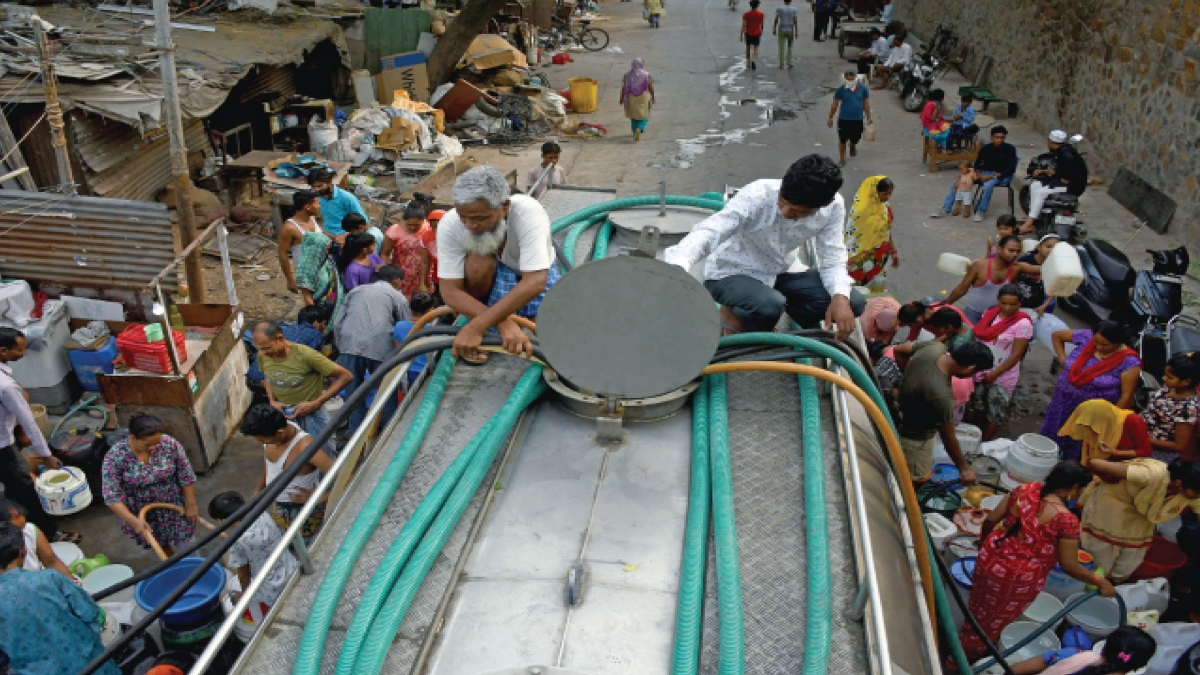Imagine a day without water. One cannot quench thirst, cannot bathe, cannot clean, cannot use toilets, cannot clean surroundings, cannot cook and life comes to a grinding halt.
Water is a finite resource that is totally irreplaceable. It is estimated that the world will run out of freshwater reserves by 2040. India and the world are staring at an imminent crisis and if we do not act now with concrete and positive steps to manage the world’s most precious commodity. It will be too late. More than often this has been a topic of discussion but the intensity of the challenges dies down at the end of the conversation.
80% of India receives its drinking water from the ground. Rampant drilling of bore wells have depleted the groundwater levels to dramatic proportions and resultantly many parts of India have an endemic problem of fluoride and arsenic contamination in groundwater which poses a serious public health risk.
Water is also a rights issue. As the global population grows, there is an increasing need to balance all of the competing commercial demands on water resources so that communities have enough for their needs. In particular, women and girls must have access to clean, private sanitation facilities to manage menstruation and maternity in dignity and safety. At the human level, water cannot be seen in isolation from sanitation.
Water is critical for reducing the global public health risk, augmenting public health, welfare and productivity of populations. Water is also at the heart of adaptation to climate change, serving as a significant link between the climate system, human society and the environment. Water is a limited resource on our planet, so using it sustainably is essential to try to halt climate change. The climate crisis is depleting the water tables and making the world vulnerable to natural disasters such as famines, droughts, floods forest fires et al.
Water is absolutely critical for agriculture. Rightfully, it produces food— the most important element after water for existence. Over 85% of the water in India is being used for irrigation.
Some startling facts: India receives over 4000 billion cubic metres of water every year of which only 8% is captured. There has been a 70% decline in per capita water availability over the last 50 years with over 21 cities expected to run out of groundwater leading to an approximate loss of 6% of GDP.
The government of India in the last decade has taken some phenomenal initiatives such as Swachh Bharat Mission, the creation of a specific Jal Shakti Ministry, and Jal Jeevan Mission to name a few. Also, the aspirational districts programme is a unique developmental innovation to bridge the gap between the haves and the have-nots. The Impact of these schemes has also been quite visible with Swachh Bharat Mission being touted as one of the most successful transformational programmes in the world. The focus on rainwater harvesting is a huge step as harnessing the most natural source of water is imperative. The need of the hour before it gets too late is sustainable water use at all levels of society and industry to supplement and complement the government’s efforts.
A holistic approach toward sustainable water management across every element of the water cycle needs to be curated, implemented, and monitored. First is to address access to water, then improve quality towards potability, monitor use and encourage reuse, audit consumption, and wastage and create a framework to assess and act towards sustainability.
The framework should encompass the water use and reuse forcing conditions across agriculture, industry, communities, and individuals. The need vis-à-vis the consumption should be monitored and accounted for. Water stewardship across the strata from Industry to agriculture to individuals should be made mandatory.
‘Water Stewardship Programme’ in India is addressed to efficient water consumption and thoughtful conservation by industries only. Currently, there is no legal framework governing compulsive water conservation by industries. Water is mostly regulated by the state governments as the constitution of India categorised it as a state subject. Though the Centre provides broad frameworks and maintains a national database on water. As of March 2019, hardly 15% of the top 500 corporates made a quantified disclosure of water consumption in their annual reports. Hence a clear data on water consumed by industries is not available in the public domain
Replacing currency with water for better realisation of its criticality and synonymising water with wealth was the germinating factor for AquaKraft’s Digital Innovation, AQVERIUM— India’s first Digital Water Bank. AQVERIUM endeavours to account for every drop of water and will offer corporates, communities, and panchayats a fiduciary and digital framework to generate a ‘Water Balance Sheet’. The objective is to make India ‘water positive’ by 2030.
One of the most important aspects is effective advocacy across every individual in India along with the actionable implementation of water stewardship. To this effect, JAL PE CHARCHA, the outreach and advocacy platform of AquaKraft, is advocating the cause of reducing the use of plastic bottles. Every drop of water that is bottled draws water from the ground, with most of them using Reverse Osmosis as a technology, which wastes one litre as a back wash and generates the sludge which is environmentally corrosive. At the same time, it eliminates all the natural minerals in water which poses a huge risk of immunity loss. Last but not the least, plastic bottles are the biggest climate risk that impacts the natural water bodies. This single call to action if adopted by Industry and Individuals will contribute immensely to rejuvenating water naturally, reduce the spending on public health, contribute to Climate positivity and unlock the economic value of water.
Dr Subramanya Kusnur is the Founder Chairman and CEO of AquaKraft Group Ventures. Views expressed are the writer’s personal.
‘Water Stewardship Programme’ in India is addressed to efficient water consumption and thoughtful conservation by industries only. Currently, there is no legal framework governing compulsive water conservation by industries. Water is mostly regulated by the state governments as the constitution of India categorised it as a state subject. Though the Centre provides broad frameworks and maintains a national database on water. As of March 2019, hardly 15% of the top 500 corporates made a quantified disclosure of water consumption in their annual reports. Hence a clear data on water consumed by industries is not available in the public domain. Replacing currency with water for better realisation of its criticality and synonymising water with wealth was the germinating factor for AquaKraft’s Digital Innovation, AQVERIUM— India’s first digital water bank.























